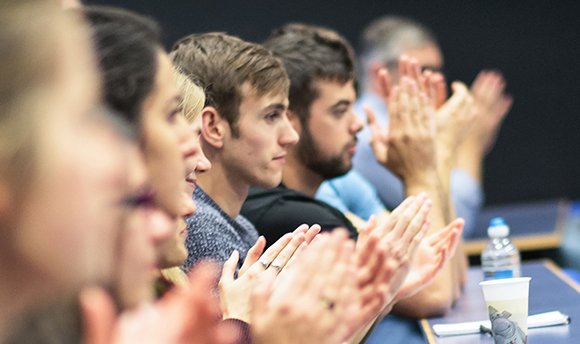This course is still open for entry in September 2024 – please visit our Clearing and Late Application page.
Nutrition - BSc (Hons)
This BSc (Hons) in Nutrition course will give you the theoretical understanding and practical skills that you will need to build a rewarding career as a nutritionist.
Attracting increasing attention in recent years, nutrition is an engaging and rewarding subject to study and provides a pathway to a range of fulfilling careers. Nutritionists generate, assess, and deliver scientific and evidence-based advice in a variety of settings to improve health and wellbeing, and to promote a healthy diet and lifestyle.
On this course you will learn the scientific and social importance of nutrition in a modern and forward looking university with excellent specialist facilities and equipment. Integrated real-world experiences, including a work-based placement module will foster your practical skills.
Compare this course with our other Dietetics, Nutrition and Biological Sciences courses.
Why QMU?
- Staff expertise: You will learn from registered nutritionists and experts in the field who are actively researching some of the most interesting and influential topics in the field. QMU has wide ranging and widely recognised expertise in both health and in food science, that is home to the Scottish Centre for Food Development and Innovation.
- Excellent facilities: You will build professional proficiency in our specialist labs, using advanced equipment and proven research techniques. The practical teaching facilities include specialist microbiology, chemistry, food handling, and nutritional assessment laboratories.
- Professional accreditation/registration: The course is accredited by the Association for Nutrition (AfN) and on graduation with an honours degree you can register with the AfN as an associate nutritionist*.
- High rankings in the UK: QMU is ranked in the top 3 of Scottish higher education institutions for Nutrition & Food Science in the Guardian University Guide 2024.
*NB the ordinary degree does not lead to registration with the AfN upon graduation.
Nutrition - BSc (Hons) : The course in brief
The science of nutrition employs evidence-based approaches to highlight the relationship between our diet and health, and it enables us to optimise health and prevent disease. The science of nutrition is concerned with how food affects the functioning of the living organism. It includes the study of food composition, how it is digested and absorbed, the production of energy, elimination of wastes and all the syntheses that are essential for growth, maintenance, and reproduction across the life cycle.
On this course you will:
- learn the academic principles behind food and gain practical skills in our advanced laboratories;
- learn how to think critically on a larger scale. What are the social, political, cultural and environmental factors affecting what we eat? How do nutritionists use evidence-based approaches to optimise health, prevent disease, and support behaviour change at an individual, community and population level?; and
- learn about the most current issues in the field of nutrition. For example, how does our gut microbiome composition impact our health? How do nutrigenetics and nutrigenomics influence current practice? What are the current/contemporary practices and policies in the field of nutrition?
How will I be taught?
Structure
You can opt to study for an honours degree over four years or an ordinary degree over three years. You will complete a range of modules each year as outlined.
Teaching, learning and assessment
Teaching is organised across two semesters each year, with three 20-credit modules in each semester. You will learn through face-to-face or online lectures, seminars, practical workshops, self-study packs and our well-equipped specialist laboratories, including microbiology, chemistry, food handling, and nutritional assessment laboratories. Outside these timetabled sessions you will be expected to continue learning through self-study. You will be assessed by a variety of methods (for example: written and practical exams, case studies, written assignments and presentations) at the end of each module or semester.
Placements
Practical learning in real-world environments is the perfect way to consolidate your skills. In Year Three, you will undertake a compulsory nutrition placement in a setting of your choice and with the support of your tutors, through the Volunteering Experience module. This can be in a variety of settings such as schools, community groups, laboratories, private practices, care homes or food and drink companies. This module has been organised to allow students to undertake their volunteering overseas if they wish to do so. The Volunteering Experience module is a great practical experience, providing students with an opportunity to network within their profession, and to enhance their employability.
Exchange opportunities
In Years Two or Three you have the opportunity (subject to availability) to study for one semester at a university overseas. Please visit the Exchanges and Study Abroad pages for more information.
Teaching staff, class sizes and timetables
You can read more about the teaching staff on this course at the bottom of this page. Please note that teaching staff is subject to change.
For more information, please also visit ‘How we teach and how you’ll learn’.
What will I learn each year?
Year One
You will:
- forge a solid understanding of the biological sciences;
- learn the fundamental principles of nutrition and integrate this with knowledge of other related disciplines; and
- develop core study and professional skills as well as laboratory and investigative (information technology and research) expertise.
Modules
- Physiology
- Contextualising You and Your Profession
- Food, Lifestyle and Society
- Biochemistry
- Cell Biology and Genetics
- Introduction to Food Science
Year Two
You will:
- further your understanding of the biological sciences;
- further develop your knowledge of the concepts relating to health and nutrition, and integrate your knowledge of biological and social sciences;
- develop life-long learning and research skills such as identifying reliable sources of information, interpreting and critically appraising scientific information, and applying this information to your evidence-based practice; and
- have the opportunity (subject to availability) to study for one semester at a university overseas. For more information, see Exchanges and Study Abroad*.
Modules
- Health Coaching Conversations
- Nutrient Metabolism
- Medical Microbiology and Immunology
- Nutrition
- Pharmacology
- Evidence-Based Practice
Year Three
You will:
- develop your knowledge of disease aetiology and management, nutritional requirements across all stages of the lifespan, and the role of nutrition in disease prevention and health optimisation at the individual, community and population level;
- explore a nutrition topic of your interest in-depth. Building on skills from Year Two, you will further your skills in identifying reliable sources of information, critically evaluating information, and developing other key professional skills such as communication;
- gain practical experience by undertaking an (unpaid) nutrition placement in an appropriate setting of your choice through the Volunteering Experience module; and
- have the opportunity (subject to availability) to study for one semester at a university overseas. For more information, see Exchanges and Study Abroad*.
Modules
- Disease Aetiology and Management
- Dissertation
- Nutrition Through the Life-course
- Volunteering Experience
- Clinical Nutrition (includes tutorials in Research Techniques for Nutrition)
- Epidemiology in Public Health
Year Four
You will:
- learn about Current and contemporary topics in nutrition science, and in food and nutrition policy;
- undertake an individual research-based project to develop and integrate your knowledge and skills in this area; and
- choose an elective module that interests you; either Health Entrepreneurship or Nutrition in Practice.
Modules
- Honours Project
- Current Issues in Nutrition Science
- Food and Nutrition Policy
- Plus one of the following two options: Health Entrepreneurship OR Nutrition in Practice
NB The modules listed here are correct at time of posting (Feb 2023) but may differ slightly to those offered in 2024. Please check back here for any updates.
*This opportunity is available in both Years Two and Three however you will only be able to undertake it in one of those years.
Career opportunities
The nutrition profession offers a wide variety of career options. Nutritionists may choose to work in areas of public health nutrition, clinical nutrition, sport and exercise nutrition, academia and research, food development and consultancy, private nutrition practice, and coaching.
For example, nutritionists may work within community settings or local authority public health teams with a focus on health promotion and policy. Depending on the role, their work might range from creating, delivering and evaluating a range of practical and educational food-based policies and initiatives to encourage healthy lifestyle change, to providing nutritional information for food production and to secure approval for health claims on packaging. Nutritionists also provide specialist advice for preventing specific diseases such as cardiovascular disease, Type-2 diabetes and cancer, or they may provide advice on healthy eating to particular client groups (for example nutritional advice during pregnancy, infancy or older adulthood). Other areas of practice include, but are not limited to, working with athletes and sports teams, or working in the food sector, for example in quality management or nutritional analysis.
Our graduates work across a number of sectors including government, academia, third-sector and private companies. Some have gone on to become Home Economics teachers through studying a PGDE Secondary (Home Economics) (a postgraduate course available at QMU).
Nutrition - BSc (Hons) : Entry requirements and application information
Entry requirements
Scottish Higher: Standard: BBBC Minimum: BCCC
A Level: BB
Irish Leaving Certificate: H2 H2 H3 H3
International Baccalaureate: 26 points
International: IELTS score of 6.0 with no element below 5.5
Am I a Widening Access student?: We apply the minimum entry criteria to applicants who meet one or more contextual factor. To see if this would apply to you, please refer to the access and application page.
Required subjects: Chemistry or Biology and preferably one other science (may include Maths or Home Economics) at Higher/A Level or equivalent AND Chemistry, Biology, Maths and English at Nat 5/GCSE. We can also accept National 5 Application of Maths or Lifeskills at the same grade.
Mature/Access: We welcome applications from mature students with relevant qualifications in Biology and Chemistry or experience. Visit our College Leavers and Mature Students Advice page for more information.
Direct Entry:
Year Two
- HNC in a related subject with B in the graded unit
Year Three
- HND in a related subject with CB in the graded units
For details of related HNC and HND courses, visit our College Leavers and Mature Students Advice page.
Other requirements
- You may be requested to be immunised against Hepatitis B.
- Students may require a PVG check for the Volunteering module.
Other costs
There may be costs associated with your placement depending on where you choose to complete this.
Disability/health conditions
If you have a disability, long-term physical or mental health condition, or learning disability, it should not stand in the way of your studying at QMU. However, if you are not sure whether your disability might be a barrier in your studies or in relation to the professional standards, please contact the disability service who will be able to have a conversation with you about reasonable adjustments and supports available to you.
Terms and Conditions
The delivery of this course is subject to the terms and conditions set out in our 2024/25 Entry Terms and Conditions (Undergraduate).
Awarding body
QMU
Specialist facilities films
Specialist facilities for Food, Nutrition and Dietetics
QMU's allotment
What is it like to study this course?
Become your best you: study at QMU
Course Overview
Opportunities to meet us: open days and more
As well as open days, we offer campus tours and online events throughout the year to help you find out more about student life and studying at QMU.
Open days and other ways of meeting us: more informationCourses You Might Also Like
- BSc (Hons) Public Health (2024 entry)
- Master of Dietetics (MDiet)/BSc (Hons) Dietetics (2024 entry)
- BSc Paramedic Science (2024 entry)
- Master of Nursing (MNurse) (2024 entry)
- Master of Occupational Therapy (MOccTh)/BSc (Hons) Occupational Therapy (2024 entry)
- Master of Physiotherapy (MPhys)/BSc (Hons) Physiotherapy (2024 entry)
- Master of Podiatry (MPod)/BSc (Hons) Podiatry (2024 entry)
- Master of Radiography: Diagnostic (MDRad)/BSc (Hons) Radiography: Diagnostic (2024 entry)
- Master of Radiography: Therapeutic (MTRad)/BSc (Hons) Radiography: Therapeutic (2024 entry)
- Master of Speech and Language Therapy (MSLT)/BSc (Hons) Speech and Language Therapy (2024 entry)













